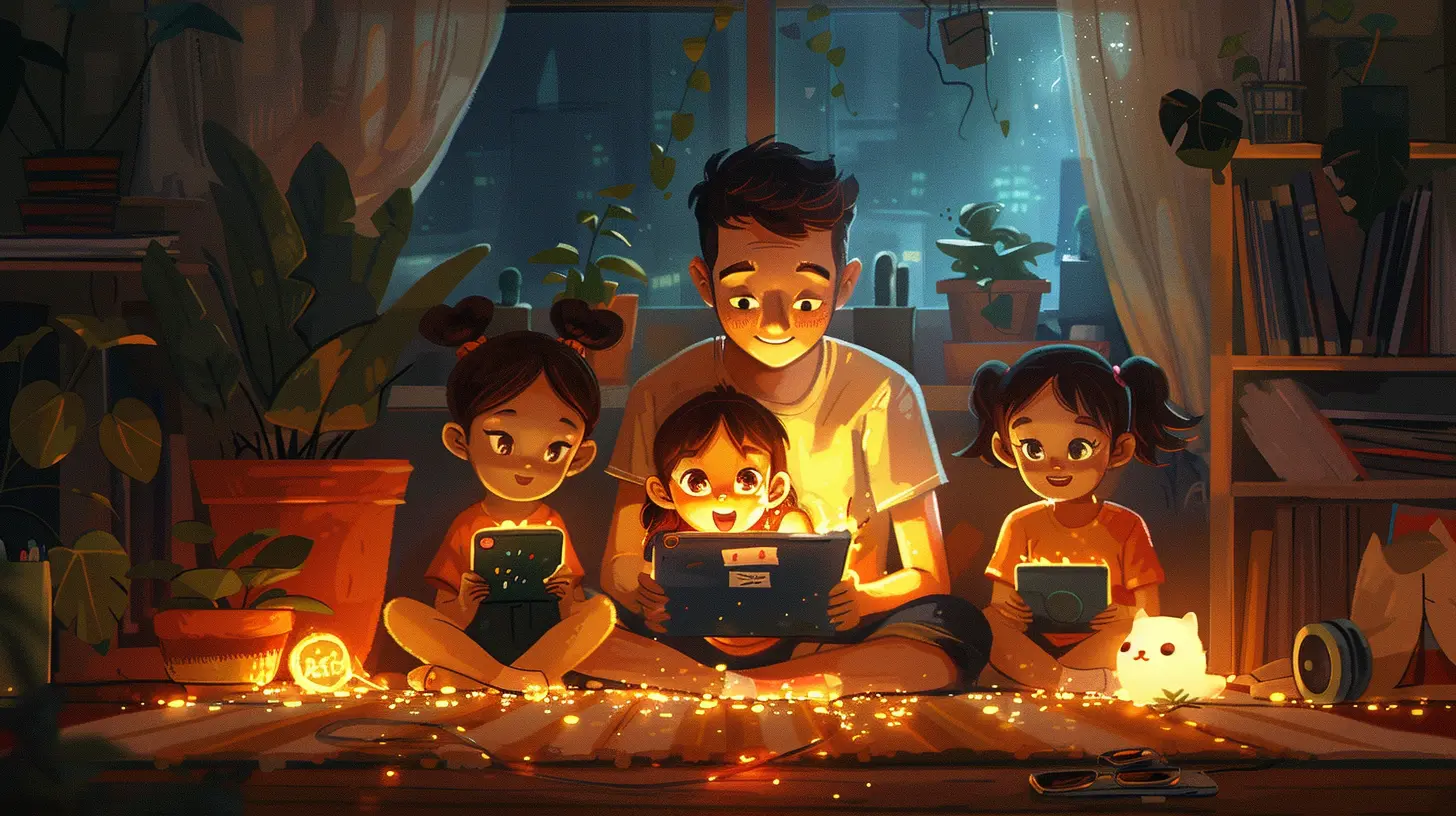Raising Responsible Digital Citizens in an Online World
3 July 2025
Let’s face it—our kids are growing up in the age of touchscreens and Wi-Fi. The internet is their playground, classroom, and social hangout all rolled into one. While this digital landscape offers incredible opportunities, it also comes with its own set of challenges. So how can we, as parents, equip our kids to navigate this world responsibly? How do we raise children who don’t just consume online content but also respect, question, and contribute to the digital space in a positive way?
It’s not about banning devices or constantly peering over their shoulders (although, let’s admit, we’ve all been tempted!). Instead, it’s about empowering them with the tools and attitudes to thrive. Let’s dig into practical tips, relatable advice, and a game plan for raising responsible digital citizens in today’s online world.
Why Raising Responsible Digital Citizens Matters
The internet isn’t just a tool—it’s a whole ecosystem. It has the power to educate, entertain, connect, and yes, even mislead. Kids today don’t just "use" the internet; they live in it. It shapes their views, their relationships, and even their values.It’s like handing them the keys to a car. Would you do that without teaching them the rules of the road? Definitely not! Raising responsible digital citizens is similar—they need to understand how to navigate this “information highway” safely and respectfully.
What Exactly Is a "Digital Citizen"?
Before we dive into the how-to, let’s get clear on what "responsible digital citizenship" means. Essentially, it’s about being an ethical and informed participant in the online world. Think of it as teaching your kids to "adult," but in the digital sense.A responsible digital citizen:
- Knows how to use technology respectfully
- Understands the importance of online privacy and security
- Communicates in a kind and constructive way
- Thinks critically about what they see, read, and share online
- Respects others’ intellectual property
In short, it’s about being smart, safe, and respectful online—qualities that, let’s be honest, even some adults could use a refresher on!
The Challenges of Parenting in a Digital World
Let’s not sugarcoat it—parenting in the digital age can feel overwhelming. You’re not just dealing with screen time battles; you’re also navigating a world of cyberbullying, inappropriate content, misinformation, and the ever-looming pressure of social media.And let’s not forget: the internet evolves fast. One day, you’re worried about Facebook, and the next, you’re Googling "What is TikTok, and how do I monitor it?" It’s like playing a game of Whac-A-Mole, but with apps and trends.
But here’s the good news: you don’t need to be a tech wizard to raise responsible digital citizens. You just need a combination of common sense, open communication, and a willingness to learn alongside your child.
8 Tips for Raising Responsible Digital Citizens
1. Set the Stage with Open Communication
First things first: you can’t guide your kids if you’re not talking to them. Create an environment where they feel comfortable discussing their online experiences—both the good and the bad.Ask questions like:
- What’s your favorite thing to do online?
- Have you ever seen something online that made you uncomfortable?
- How do you decide what to share on social media?
The goal here isn’t to grill them but to stay connected. Think of it as opening a two-way street—if they trust you, they’re more likely to come to you for advice when they need it.
2. Teach the Golden Rule of the Internet
You know the age-old golden rule: "Treat others as you want to be treated"? It applies online too. Teach your child that their online words and actions have real consequences, even if they can’t see the person on the other side of the screen.Remind them that:
- Hurtful words in a comment section are still hurtful.
- Sharing someone else’s embarrassing moment without permission is a violation of trust.
- A joke to one person can be cyberbullying to another.
Encourage kindness and empathy—two things the digital world could definitely use more of!
3. Introduce Basic Online Safety Rules
Think of online safety as putting on a seatbelt before driving. Make sure your kids know these basics:- Never share personal information (like their address, phone number, or school name) online.
- Use strong passwords and keep them private, even from friends.
- Be cautious when clicking on links or downloading files—they could be phishing scams or malware.
Consider role-playing scenarios to make these lessons stick. For example, pretend to be a stranger online asking for personal info and see how your child responds. It’s a fun way to teach a serious lesson.
4. Help Them Spot Fake News
Raise your hand if you’ve fallen for clickbait before (no judgment, we’ve all been there!). Teach your kids how to differentiate between credible sources and sketchy ones.Explain the importance of fact-checking and encourage them to:
- Look at the URL—official websites usually end in .gov, .edu, or .org.
- Cross-check information with other trusted sources.
- Avoid blindly sharing articles based on their catchy headlines.
Think of it as equipping them with a digital magnifying glass to scrutinize the content they consume.
5. Discuss Social Media Responsibly
Ah, social media—the double-edged sword of our time. It’s a great way to connect with friends, but it can also amplify peer pressure and unrealistic standards.Talk openly about:
- The fact that people usually post their "highlight reels," not their real lives.
- The importance of pausing before posting anything—ask, "Would I say this or show this in person?"
- The idea that "likes" don’t define self-worth.
Help them set boundaries, like keeping private accounts and not accepting friend requests from people they don’t know. And hey, set those boundaries for yourself too—kids learn by watching!
6. Set Screen Time Boundaries
Let’s admit it: screen time can be a battle. But setting boundaries is essential to ensure your kids strike a healthy balance between their online and offline lives.Instead of an outright ban, try:
- Setting device-free zones, like during meals or before bedtime.
- Creating a family tech agreement outlining when and where devices can be used.
- Encouraging hobbies that don’t involve screens, like sports, reading, or art.
Think of screen time like ice cream—it’s fine in moderation, but too much can lead to a stomachache (or, in this case, tech fatigue).
7. Be a Role Model
Let’s be real—kids notice everything. If you’re glued to your phone during family time or engaging in online arguments, they’re likely to mimic that behavior.Show them what responsible digital citizenship looks like by:
- Being mindful of your own screen time.
- Treating others with kindness online.
- Fact-checking articles before sharing them.
It’s a "monkey see, monkey do" situation, so make sure you’re modeling the habits you want them to adopt.
8. Stay Informed About Trends
Lastly, stay curious about what your kids are into. Whether it’s a new social media app, a trending game, or the latest viral challenge, staying informed allows you to guide them more effectively.Ask them to teach you how a specific app works—trust me, they’ll love showing off their expertise. It’s also a great way to bridge the digital divide and understand their world better.
The Long-Term Payoff
Here’s the best part: raising responsible digital citizens isn’t just about surviving the online world today. It’s about setting your kids up for life. The ability to think critically, act ethically, and engage respectfully will serve them well beyond their internet years—whether they’re tackling a group project in school or navigating their future careers.And remember, you’re not in this alone. The goal isn’t perfection—it’s progress. By laying a foundation of trust, communication, and shared responsibility, you’re giving your kids the tools to thrive in a digital world while staying true to themselves.
So let’s stop worrying about the latest app update and focus on what really matters: raising kids who know how to use technology wisely, kindly, and responsibly.
all images in this post were generated using AI tools
Category:
Parenting AdviceAuthor:

Tara Henson
Discussion
rate this article
1 comments
Caitlin Harper
Teaching kids to navigate the digital world responsibly is essential. Encourage open discussions about online behavior, set clear expectations, and model healthy tech habits. Utilize parental controls and educational resources to guide them. Empowering children with critical thinking skills will help them make wise choices in their digital lives.
July 10, 2025 at 3:12 PM

Tara Henson
Absolutely! Teaching responsible digital navigation is crucial. Open discussions, clear expectations, and modeling healthy habits will empower kids to make wise choices online.


